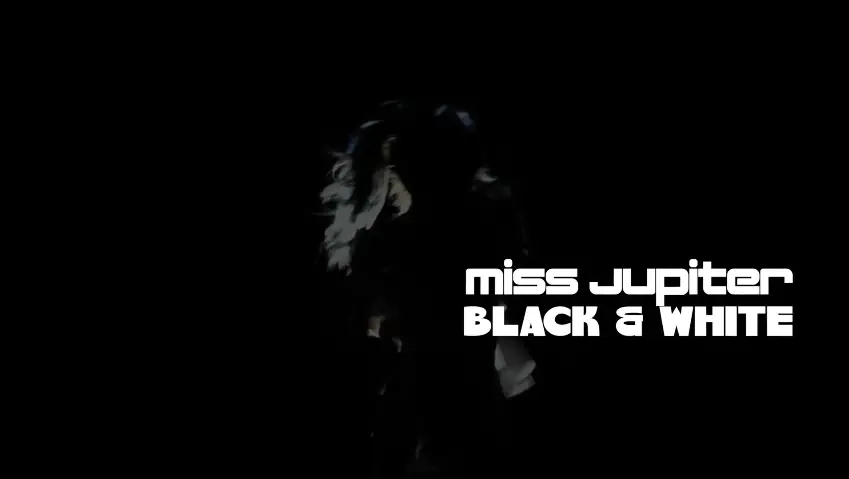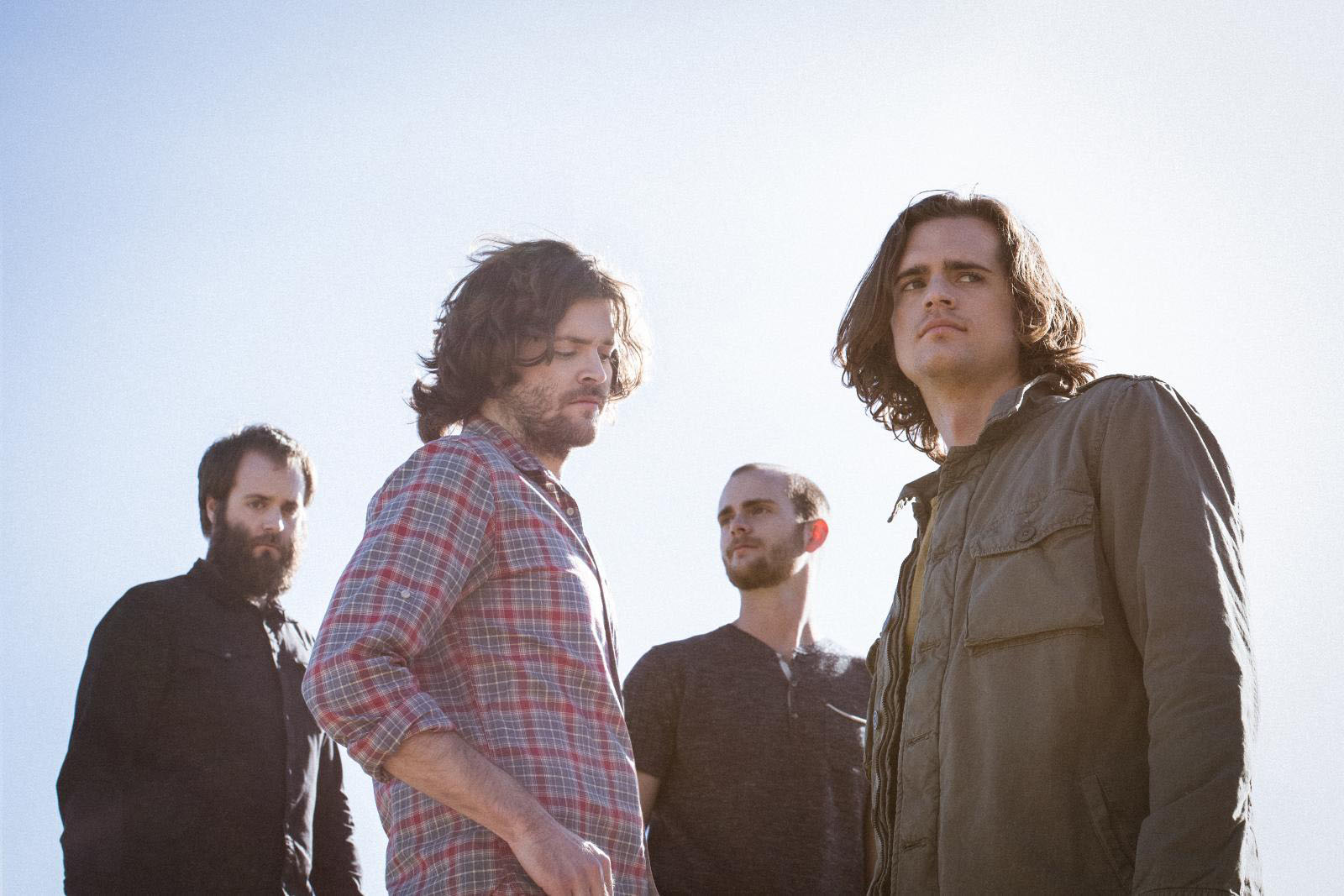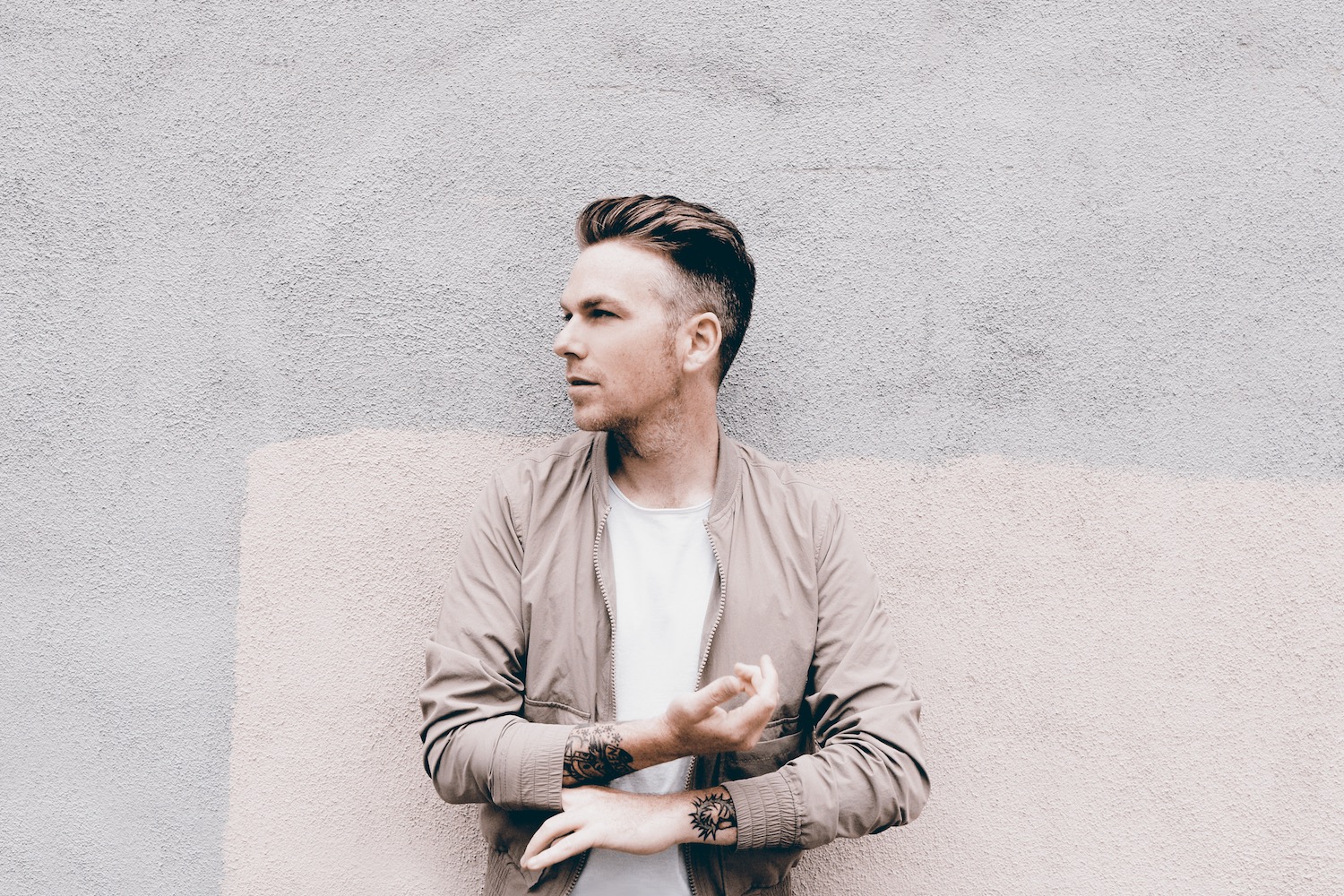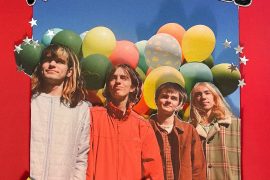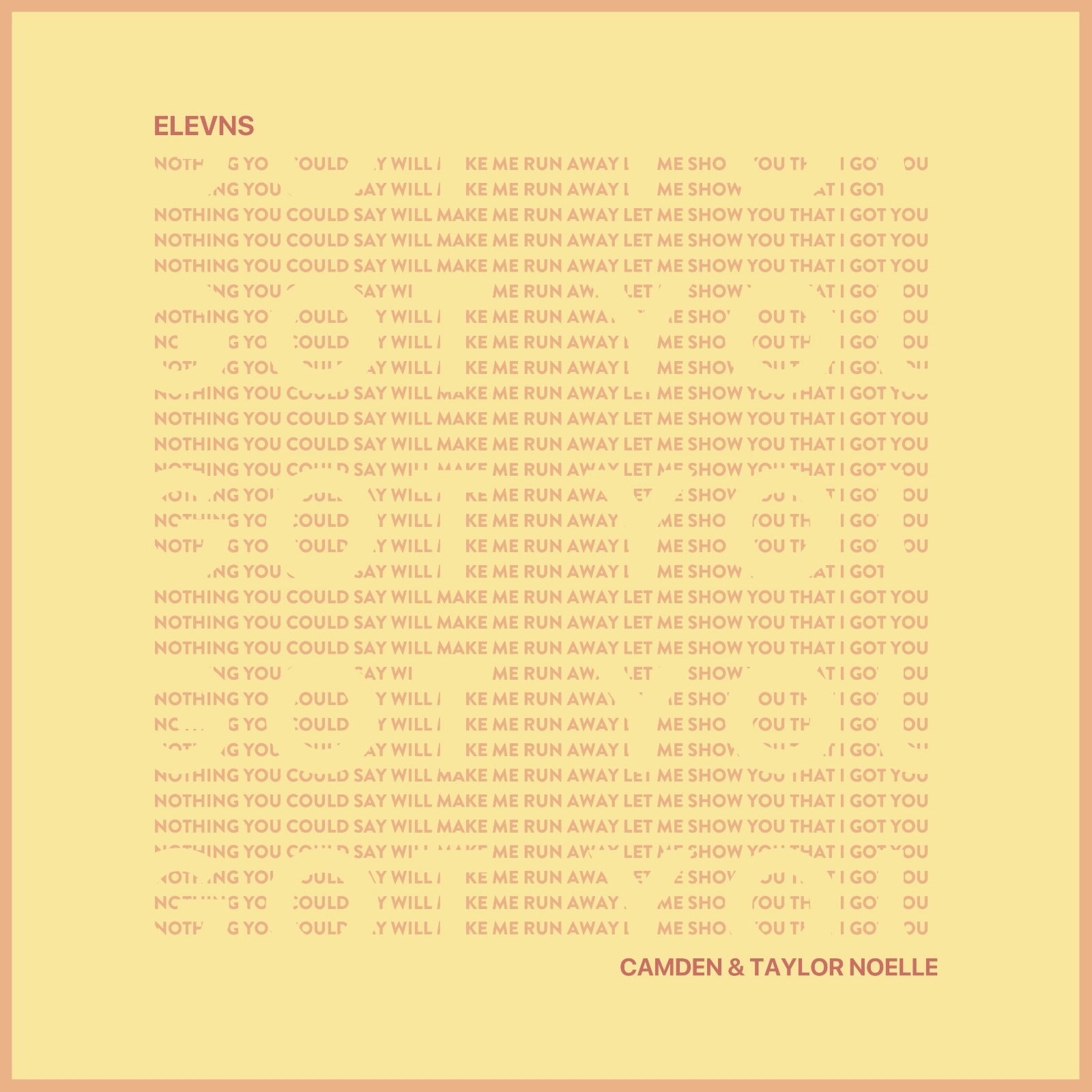Schitt’s Creek star and singer/songwriter Noah Reid discusses the intimate emotions and intent behind his newly released third album ‘Adjustments’, a stunning record that moves with a quiet intensity, unbridled passion, and heart-on-sleeve sincerity.
Stream: ‘Adjustments’ – Noah Reid
He is best known for his role portraying Patrick Brewer in the Emmy Award winning show, Schitt’s Creek, but it won’t take long until people come to know Noah Reid the singer/songwriter as well as they know Noah Reid the actor.

Hailing from Toronto, Reid has been a musician for as long as he’s been in acting – which dates back to the late ’90s, when he landed the role of voicing everyone’s favorite turtle, Franklin, at the age of 10. For a long time, songwriting was Reid’s private passion – an unconscious form of self-therapy he had all to himself, and one that helped him navigate the throes of a turbulent and fickle acting world. “I don’t know if I ever thought I would do music full-time,” he admits. “Like a lot of people in the entertainment industry, you’re not really sure what’s around the corner, and at some point, every actor, I think, has had the moment of, ‘Am I gonna continue to do this? How much longer can I stay in here?‘”
Fortunately for Reid, around every corner of doubt has been a great opportunity.
He was hired to join the cast of Schitt’s Creek in 2016, shortly after which he independently released his debut album, Songs From a Broken Chair. He was regular on the series by late 2017, and continued with the show through to its finale in 2020 while also appearing in multiple independent films and stage productions around Toronto. By the time he released his sophomore album Gemini in mid-2020, Reid knew he wanted to maintain a foot in both music and acting.
“For me, really it’s the two things at once,” he says. “That was a big motivator in the naming my second album, Gemini, that really doing two things at once has become a big part of my identity in my creative life force; that it’s not one or the other – it’s both. That is how this creative life has unveiled itself to me, and I’m grateful for that. I think that when one thing is not going, then the other thing has an opportunity to take over, and that ability to not be standing on one leg has been beneficial for me.”
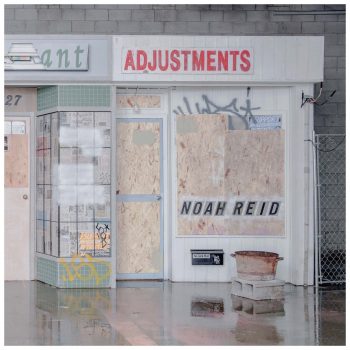
Noah Reid’s third album solidifies him as a standout singer/songwriter with a captivating voice and an intimate, moving artistic perspective.
Independently released June 24, 2022, Adjustments is a soul-stirring record of inner reckoning and reflection. Working with longtime collaborator and producer Matt Barber, Reid takes listeners on a rousing eight-track journey deep into the heart of his inner sanctum: His songs range from heartfelt outpourings of love, to introspective moments of uncertainty and doubt, to ruminations on greater societal issues like inequality, racism, and privilege, to unpacking the disconnect, listlessness, and loss of purpose we all felt toward the beginning of the COVID-19 pandemic.
“I think music really helped me to process what was going on,” Reid shares. “A lot of the social and racial unrest and some of the protests in the streets, and the feeling of disconnected-ness and the horrible shit-show of American politics and racial injustice. It was quite a heavy time. I think that for me what that illustrated was that this time we’re living in is really, it’s a challenge, it’s a daily challenge to get through. And the bright spots are incredibly bright because of that, in contrast to the darkness – and the darkness is everywhere, it’s inescapable. It feels like some days it’s all that there’s gonna be. And then occasionally a cloud shifts and you just get an incredible beam of sunlight. I feel like that’s kind of what I hoped that the band would do to these songs, and each one of these musicians brought so much to it in our brief time in the studio that just allowed for that textural landscape to move through all of those psychological and emotional spaces that we’ve all been inhabiting within ourselves in our condensed communities.”
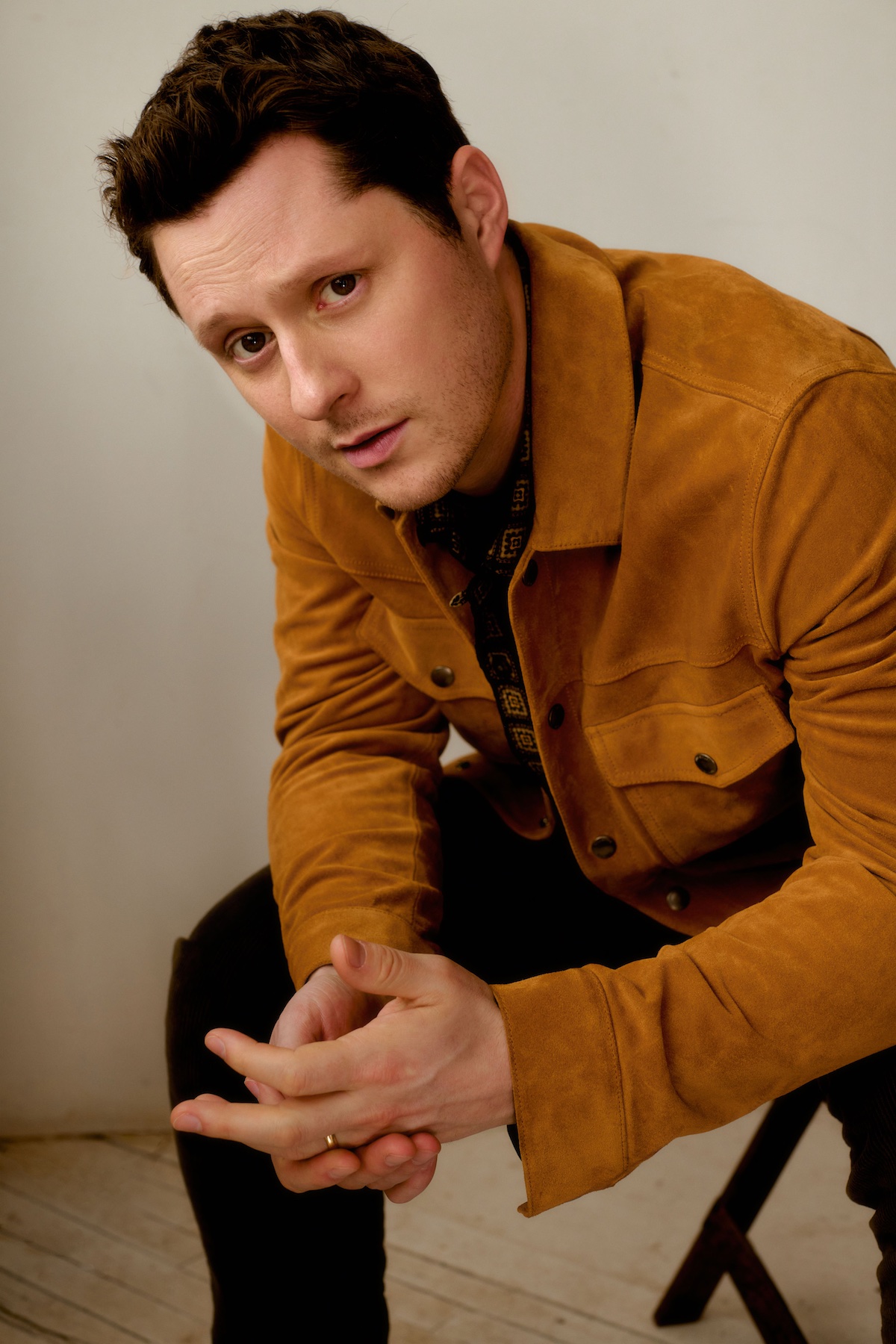
Adjustments came about during a period of considerable transition in Reid’s own life.
Schitt’s Creek was coming to an end, he was in the process of planning a wedding, and atop all that, the world had come to an eerie standstill. This manifests in a kind of musical darkness that is at times hard to shake. Adjustments moves with a quiet turmoil, a kind of tender turbulence that’s always threatening to spill over into something more volatile and explosive. All of this, as Reid honestly, candidly wonders, “What’s a way forward? What’s an adjustment that I can make? How can I shift myself and my art form, and my community, my people, my family, my fans? Whatever it is, how do we move forward in a meaningful way?“
Highlights on Adjustments range from the candid, dreamy folk song “Everyday” and the brooding, deeply introspective “Michigan,” to the smoldering and cinematic finale “Everything’s Fine” (listen through to the end for an absolutely searing guitar solo, courtesy of Matt Bailey) and the epic and aching power-ballad, “Rivers Underground” – previously named one of Atwood Magazine‘s Editor’s Picks. A heated, elegant and emotional song, “Rivers Underground” showcases the best of Reid’s talents as a vocalist and songwriter: He seems to hold everything back while giving it his all in an uncompromising expression of the intensity, the purity, and the fullness of his love for his wife:
If I don’t love you now
Then I might never love you
There’s rivers underground
Goin’ nowhere
Goin’ somewhere
And if I didn’t look around
I might have never found you
And this game of lost and found
Is goin’ somewhere
Or it’s goin’ nowhere
“Rivers Underground” is seismic in scope and graceful in nature, with great string swells, emphatic piano chords, and gentle guitar licks ebbing and flowing with nuance and tremendous emotion as Reid expresses sheer wonder and amazement at the miracle of love, and the beauty of finding someone who loves you just as much as you love them in this frenzied, chaotic, and endlessly turbulent world. He sings his heart out, rising high and falling low with great care.
“Leading up to my wedding, I was really reflecting on my relationship with my wife, who is just totally my rock, my entire world, and how easy it would have been for us to miss each other and not be at the stage that we’re at. It just felt like this powerful pull that people find each other and flow together for a while,” Reid explains. “That felt like there’s a choice and there’s an inevitability to love, and that confluence just felt like it was incredibly meaningful during that time.”
So if I don’t love you now
Then I’ll lose you forever
I’m just workin’ my way down
Just flowin’ over
And fallin’ over
So let me take your hand
And I won’t pull you under
And one day you’ll understand
So just let me take your hand
I promise not to pull you under
And one day you’ll understand
How much I love you
And is it any wonder
Is it any wonder…?
Over six and a half minutes, Noah Reid treats listeners to a truly dazzling display of affection, devotion, and connection. “Rivers Underground” feels timeless in itself, and yet it is just one of Adjustments‘ eight wondrous songs: A mere snapshot of the sheer intensity, bold sonics, and visceral, vulnerable feelings that went into the making of this album.
Atwood Magazine recently caught up with Noah Reid to discuss the inspirations, influences, and emotions behind Adjustments.
Dive into the deep, sometimes dark, and always stirring depths of this beautiful and breathtaking album in our interview below, and find out why we think Noah Reid the singer/songwriter deserves as much attention as Noah Reid the actor – and why ultimately, the two are one and the same.
— —
:: stream/purchase Noah Reid here ::
Stream: ‘Adjustments’ – Noah Reid
A CONVERSATION WITH NOAH REID
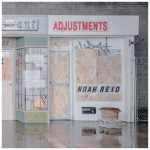
Atwood Magazine: Noah, thanks so much for your time today. I've heard you're really good at counting by twos and tying your shoes, but today, I want to talk about your music and artistry.
Noah Reid: Nice! [laughs] That’s pretty good. It’s a solid throwback.
Firstly, congratulations on Adjustments' upcoming release. How does it feel to have this deeply personal collection of songs coming out so soon?
Noah Reid: Thank you, it’s great. These songs, I’ve lived with these songs for many years now. Probably the earliest written song I probably wrote around the time or the end maybe in 2019, so I’ve been hanging around with these songs for a while and it’s nice, the prospect of sharing them is just very exciting. Of course, you make these songs about yourself from a reflection of your own experience, but the best thing to do with them is give them away and let people have their own experience with them. I’m really proud of this record; I think this is my favorite of the three that I’ve had the opportunity to make with Matt Barber, and just really, really proud of the band that we assembled. And some of the sounds and the songs themselves, I think they’re probably some of my favorite tunes that I’ve written, so it feels like a good collection.
Between acting in multiple acclaimed television shows, touring the most recent one across the continent, and now performing on Broadway, how do you find the time for music?
Noah Reid: For a long time, music just found the time for me and found the cracks in my acting life and what I would have called my professional life – there was a long time where those cracks were a lot bigger, and I relied pretty heavily on music and writing songs to get me through some of that stuff. Certainly the acting world presents you with lots of challenges, and so music was a way for me to process that in a lot of cases, and now it’s interesting. As those gaps get a little tighter, it’s harder to find moments to sit down and write things, moments to have that reflective time. That’s the time that I love to write songs is when I’m like, “Okay, I have a few hours here, let me just… ” And I have the place to myself, let me just start playing and see what happens. I don’t know how that will change as my career moves forward, certainly, as my wife and I are expecting our first child, so that’ll definitely change…
Congratulations!
Noah Reid: Thanks. That’ll change the landscape quite a bit, I would imagine. But music has always been such a huge part of my life, and it will always be in whatever way, it’s clear that it will find its way into my world.
It sounds like music for you is a very personal thing that you started off writing for yourself, not for others. I know it wasn't until 2015-2016, when you really started sharing that with the world and you released your debut album Songs From a Broken Chair back then, before you had assumed the role of Patrick Brewer in Schitt's Creek, before the world knew you once more, the grown up you. At that time, did a part of you think you were transitioning away from 20 years of acting and into music full-time?
Noah Reid: I don’t know if I ever thought I would do music full-time. I wasn’t sure, like a lot of people in the entertainment industry, you’re not really sure what’s around the corner, and at some point, every actor, I think, has had the moment of, “Am I gonna continue to do this? How much longer can I stay in here?” And for me, I’ve been lucky that right around every corner of doubt has been a great opportunity. But I think for me, really it’s the two things at once, and that was a big motivator in the naming my second album, Gemini, that really doing two things at once has become a big part of my identity in my creative life force, that it’s not one or the other, it’s both. And that is how this creative life has unveiled itself to me, and I’m grateful for that. I think that when one thing is not going, then the other thing has an opportunity to take over, and that ability to not be standing on one leg has been beneficial for me.
And there have been moments of cross-over. You sing a couple of times references to your acting career in Schitt's Creek and others in this latest album. And of course, we all know that on Schitt's Creek, your performance of “Simply the Best” brought a tear to so many eyes, mine included. Did you know going into that role? Was it a part of the call sheet that you had to perform that song?
Noah Reid: No, I didn’t know until I read that episode. But in between season three and four, I released Songs from a Broken Chair, and I remember at my release show, Dan Levy came and I could see him with his spectacled silhouette standing at the back of the room at the Burdock in Toronto, and that meant a lot, having his support as a friend and as a colleague. And little did I know he was gonna use that against me or for me, in the form of this… [laughter]
I think he recognized the opportunity there and also chose a brilliant song that could be so meaningful in that relationship. And he’s a lover of music and a really brilliant creative mind and soul, and it’s not, probably not a song I would have covered on my own. And he also gave me the license to play around with it in my own way, which I really appreciated it. It takes an artist to let another artist do that sometimes and… Yeah, it was very, very meaningful and obviously created a bit of a pathway for me to introduce my music to a lot of people who wouldn’t have probably found it otherwise.
Adjustments now arrives two years, two very long years I should add, after your second album Gemini. How do you feel you've grown or changed since releasing that last record?
Noah Reid: Well, I think we’ve all probably changed a lot in the last couple of years, and sometimes in ways that we’re not super comfortable with. But the challenge of the last two years and the big turn that none of us knew we were heading for, being COVID, obviously, and then some of the reflections, that period of isolation and removal of all of our things that we took for granted, the togetherness… The life as we knew it just disappeared, so we all had to make a lot of adjustments. We recorded this album in the middle of that, at the end of 2020. I knew I was going to New Mexico to shoot a television show for seven months, and I felt like that was… I had eight songs and they felt like a group, and I just wanted to get into the studio before I left.
And the word adjustments just keeps coming up in the creative space. It’s all about when you’re in the studio, you’re tweaking things… There’s a hopefulness to the word. It’s not that everything needs to be thrown out and redone, it’s that it just needs some shifting, some sanding down, some owning. I fell in love with that notion and it felt like an undercurrent for all of the songs, no matter what they’re about in their own little container, they all feel like they fit into this container of adjustments. I think that’s probably true of the people who will be listening to these songs, too.
And nevertheless, there's a difficulty and a darkness about this album that I think is hard to shake. The way I've been best able to describe Adjustments really to myself is that it moves with a quiet turmoil, a kind of tender turbulence that's always threatening to spill over into something more volatile and explosive, and certainly it does in some spaces. You were already talking about how this album came during a period of transition in your life. Can you share a little more about the story behind these songs and what, if any, overarching things were going on for you? I know it's end of one era in you professional life, I know you got married... What else have you got going on?
Noah Reid: Yeah, you’re hitting some big ones there. The pandemic was the space where my professional landscape was changing a lot with Schitt’s Creek coming to an end and not really knowing what was coming up after that. Going on my first tour as a musician and having that end abruptly eight shows in. And really heading home to what a lot of people did was like, “Who knows what’s happening and how long this is gonna go for?” But it was a definite adjustment, playing sold out shows and then being at home watching Netflix. It just was… That was a tough pill to swallow.
And then planning a wedding that we thought we were gonna have all of our favorite people at and then deciding we were gonna day by day going, “Are we still gonna do this and how, and what would it look like, and how can we be safe?” There were so many moments of this. I think music really helped me to process what was going on – a lot of the social and racial unrest and some of the protests in the streets, and the feeling of disconnected-ness and the horrible shit-show of American politics and racial injustice. It was quite a heavy time. I think that for me what that illustrated was that this time we’re living in is really, it’s a challenge, it’s a daily challenge to get through. And the bright spots are incredibly bright because of that in contrast to the darkness and the darkness is everywhere, it’s inescapable. [chuckle]
It feels like some days it’s all that there’s gonna be. And then occasionally a cloud shifts and you just get an incredible beam of sunlight. So I feel like that’s kind of what I hoped that the band would do to these songs, and each one of these musicians brought so much to it in our brief time in the studio that just allowed for that textural landscape to move through all of those psychological and emotional spaces that we’ve all been inhabiting within ourselves in our condensed communities.
There are songs, like “Michigan” to me is one that just is like the story of a day, and it was just a pivotal day in that time period where I was driving to my sister’s place in Michigan to help her pack up and move back to Canada. And some of the thoughts and the things that were happening in the world around us at that time and just really trying to honestly reflect on, “What’s a way forward? What’s an adjustment that I can make? How can I shift myself and my art form, and my community, my people, my family, my fans? Whatever it is, how do we move forward in a meaningful way?“
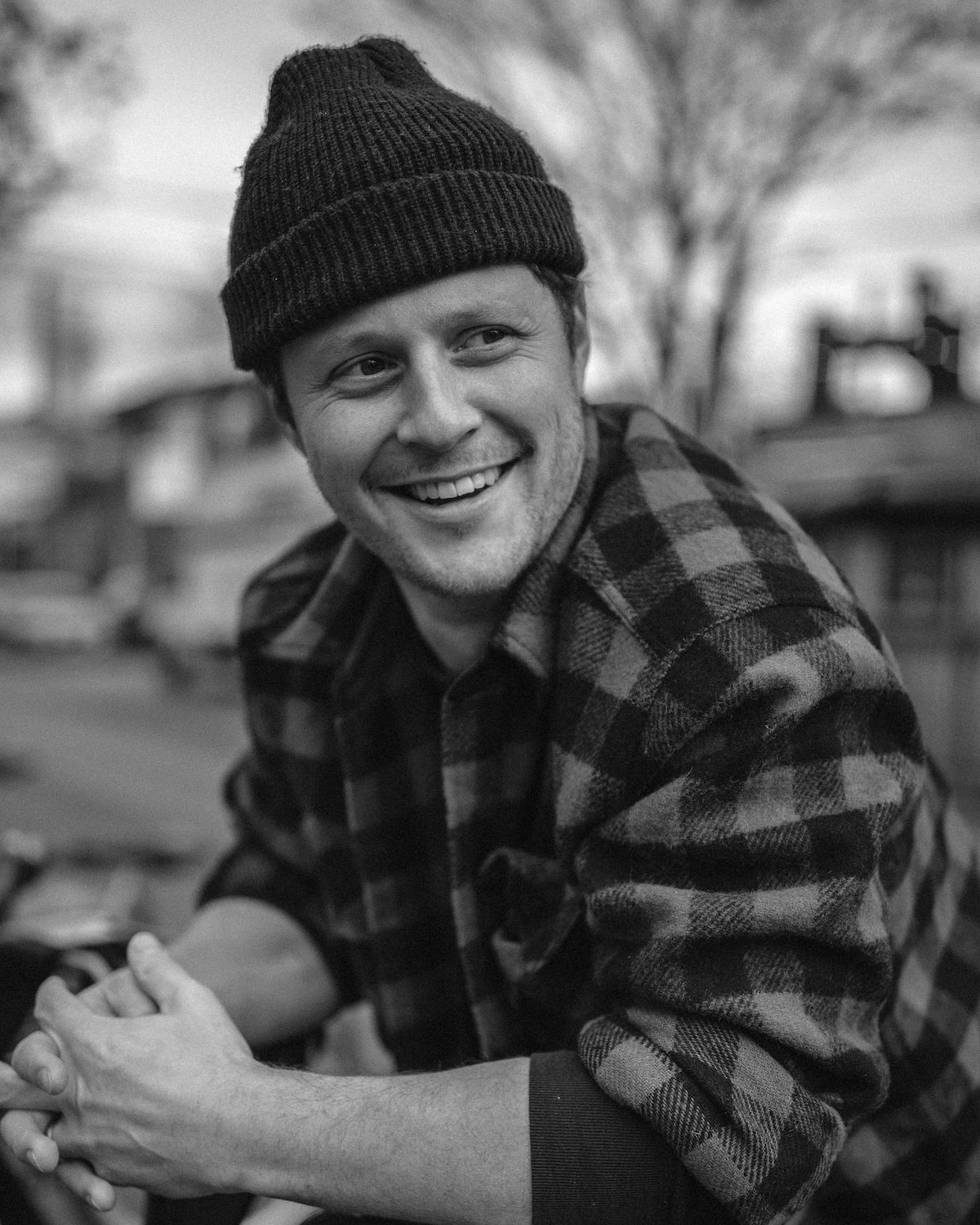
Writing songs has always been my form of therapy too, for as long as I can remember. I feel so close to this record and everything it represents. What was your experience like working with Matt Barber? What did he bring to the table when it came to shaping this record and bringing these songs to life?
Noah Reid: Well, Matt Barber’s been a friend for a long time, and we’ve now made three records together and I think every time that we approach a new record, we think about what element of the process do we want to expand, then how do we wanna approach it differently, sonically and I think that every time that we’ve gotten into the studio, things have just gotten a little stranger, a little more… The scope broadens in an interesting way, I think. Songs From a Broken Chair we did that record in two days, everything live off the floor, and it was pretty like… There was a kind of a… An of the moment… I don’t know how even to describe it, but it felt like it wasn’t mega produced by any stretch. And with Gemini I know we wanted to expand that, go for some lusher sounds, and we did 17 songs and pared it down to, I think, the 12 that are on the record.
And with Adjustments, there were eight songs. Some of them were longer, some of them felt bigger. I’m thinking of “Rivers Underground” and “Statue’s in the Stone” that I know we wanted to have these kind of… There’s a kind of a build and an epicness to the heights of the emotional landscape. And there’s some much sort of quieter, moodier, vibier stuff in the what we call the M songs, the “Michigan” and the “Minneapolis”. Those songs feel a little bit more quiet and intense and the instrumentation… In “Minneapolis”, there’s a reference to Bob Dylan and Tom Waits, which are two of my pillars of musical genius, and for Matt as well. We talk endlessly about Dylan and Time Out of Mind, which is a record that we both really love and that kind of… Some of the percussive stuff that happened there, the overdubbing some kind of drums that are way back in the distance is sort of a second pass of the kit for our drummer, Josh Van Tassel.
Bringing in some new sounds, bringing in Christine Bougie on the guitar and Josh Van Tassel and Devin Henderson as a rhythm unit, along with my longtime collaborators, Matthew Bailey and Adrian Cook, that felt like a band that really just had this really great blend of familiarity and newness that I think reflected the themes of the record really well. And having two guitars, having Christine and Matt Bailey playing off of each other was brilliant.
But to get back to Matt Barber, I think that he always, he just hears the song really clean in his first hear. In his first lesson of the iPhone demo that I send him of it, he just has an immediate sense of how to fill that out. And also, he’s got a light touch in the studio. He lets the band find it and then he’ll come in with a thought for the drums or a thought of like, “Maybe we take the seven off of that quarter or… ” And he’s a brilliant songwriter and vocalist himself, so he really understands the process of writing a song and delivering it. He’s been a great coach for me in terms of being in the booth and thinking… We joke because he’s so zen-like. He’ll just be like, “Yeah, that was great. I think maybe we do one more and then, who knows? Maybe then we take a break.” It’s just the softest touch, but you know that he’s not gonna let it go without it being right, and you know that when he thinks it’s right, you can trust that.
And up on stage we talked in circles
Every night’s about the same
But there’s nowhere else that I hear cheering
When someone says my name
And we climbed into a private jet
To take us out of town
And I thought we might not make it
As the snow was coming down
– “Minneapolis,” Noah Reid
That's great. That's what you need always. One thing I noticed right off the bat is how many longer songs you've got on here. “Rivers Underground,” “Minneapolis,” “Statue's in the Stone” and “Everything's Fine” are all well over five minutes. I get letting the song guide you, but to what do you owe this desire, leaning towards such drawn out recordings?
Noah Reid: Well, I don’t know if Time Out of Mind is a good reference. There’s a song on that record called “Hearts in the Highlands” or maybe it’s just “Highlands,” I can’t remember, what it’s like 12 minutes. I don’t know, I think the way that we listen to music now is… We don’t rely on the radio quite as much as we used to and those sort of three and a half minute or two and a half minute songs just… I’ve always been one for a longer song. I feel like often when I start exploring a song, it will take me to exactly as you say, you let the song guide you and see you shepherded a little bit. You sand it down here and there, but it feels like the longer ones just had to be that way. I think particularly with “Rivers” and “Statue’s,” those songs just had a real beginning, middle, and end kind of three-act structure to ’em.
I love how transformative these songs really are. I can't tell you the number of times I've already listened to this record; it's not a record for idle consumption. I don't think it's a record for bright summer day when you're sitting out having a picnic with your friends. It's intense, and a bit deeper... There's a lot of emotional depth here, and it's made to be really heard and to be felt. I appreciate that you didn't do just a bunch of three and four-minute tracks – that you did go above and beyond and trusted your gut.
Noah Reid: Thanks man. Matt and I are both love listening to records, and putting a record on and listening to it and flipping it over. There’s a ritual to it, there’s a feeling to it, there’s a warmth to it, there’s a nostalgia to it. It’s how I most enjoy listening to music. And I probably think a little bit too much about the side A and the side B when I’m on the record. But that’s how I love to consume it. And there’s always gonna be playlists, there’s always gonna be singles. When it comes to singles, I’m an independent: I don’t have a label, so I just go, “Okay, well, maybe this song, I don’t know it felt…” I want people to listen to this song.
We didn’t release “Left Behind” as a single and probably we should have, but I wanted to put “Minneapolis” out there in a space that it wouldn’t probably usually get that single release run, and same with “Statue’s in the Stone” just based on the length. So I don’t know, everything’s fine. We did a radio edit of it and I have no time for the radio edit because to me, the whole record builds to this like, burn it down guitar solo that Matt Bailey just threw down on right before he left the studio. And hearing that then just kind of get cooking for about 5 minutes, I just sat in the booth and just watched it happen. It was just so incredible.
That's possibly one of my favorite songs on the record. It's just so epic. You mentioned Bob Dylan, I grew up on Billy Joel – to me, he's an albums artist! I listen to Turnstiles, River of Dreams, Piano Man all the way through, no skips. There's something about this record where you finally get to that final track, and “Everything's Fine.” Nicely deceptive title, but it just explodes and I love it.
I want to move on and dive into a few of these songs if you don't mind. “I could fill a novel with the I don't knows. Try to find a friend on the radio, looking in the mirror, feeling proud of the greys, there's not a lot for me to celebrate these days,” you sing on “Everyday.” It's a powerful song, let alone a powerful introduction to the album as a whole. Why open the record with this track?
Noah Reid: I think this was probably the first song that I thought, “Okay, we’ve got… ” This is maybe the second song that I’d written on this group of songs. “Minneapolis” came first, but once I had “Everyday” too, I thought, “Okay, well, this is the best I can explain the feeling of the early days of the pandemic.” And little did I know that would stretch.. We’re in year three now. It just felt to me, there was something kind of honest and cheeky about it, and a little bit empty and a little bit hopeful, that felt like the tone of the record that I wanted to set; it sounds different than the other songs on the record, I think. But it felt to me like kind of an Everly Brothers take on a Wilco song or something kind of shiny and dusty all at the same time. I wrote it in my basement at three in the morning and it was like, “Well, okay, I guess this is what I’m gonna do for this pandemic. I’m gonna make a record.”
And you did, and it's great. The line that really stuck with me, especially when I first reviewed it when you first released it, was, “I guess we thought things would pretty much stay the same and now it's changing every day.” When I heard these lines, they brought me back to my own early pandemic experience. Of course, the more I think about it, the more I can feel you navigating through so much more than that. But on a record of change, this song feels like a thesis statement.
Noah Reid: Yeah, I think that’s right. It’s the first sentence of the novel that you wanna set the table with a little bit. And yeah, I felt like it’s rare to me that I write a song that is as concise in a way as that tune is. It felt like radio to me. It felt like, the kind of the cleanest I could say it in the fewest possible words, and it’s still true, it’s still changing everyday we’re on… I’m on Broadway and it’s like, the rules are changing, we’re testing every 48 hours. It’s like, “Okay, well, I’m listening to the radio here and mask mandates are coming back, they’re not coming back, like it’s very hard to keep up with.” It’s hard to care about, but it’s important.
I really connected with “Rivers Underground,” and the sheer HEAT of this passionate ballad. It's incredibly elegant, emotional, and it feels like you hold everything back while giving it your all! How did this one come together for you?
Noah Reid: Well, I wrote this one over a long period of time. Leading up to my wedding, I was really reflecting on my relationship with my wife, who is just totally my rock, my entire world, and how easy it would have been for us to miss each other and not be at the stage that we’re at. And Toronto, is a city that’s built on all of these rivers that have been buried, rivers and creeks that got buried because it was more convenient to put roads over top of them, and there are all these sort of underground creeks that are running underneath the city that we live in and that we met in and that we’re both from, and it just felt like this powerful pull that people find each other and flow together for a while that felt like there’s a choice and there’s an inevitability to love and that confluence just felt like it was incredibly meaningful during that time.
And if you don’t leave me now
Then you might stay forever
Oh I know it’s hard to figure out
If you belong here
If we belong here
But if you lay on the ground
Then I’ll lay down beside you
And we don’t have to talk about
We’re goin’ somewhere
Or goin’ nowhere
And I love how on “Michigan,” you reflect on COVID, privilege, death, “I probably saw ten bodies, as if one was not enough.” I really appreciate the perspective and honesty you bring to this track – it's indicative of the honesty and vulnerability you bring to the entire album. How do you deal with some of these things like privilege and reckoning with COVID in the position that you're in?
Noah Reid: How does anybody? It’s a difficult thing to be alive, and I think part of how to filter experience and privilege is acknowledging it and trying to understand things from a different perspective, and I think that’s maybe easiest done, reflecting on your own experience saying, “Okay, well, what are my set of given circumstances?“
When I’m playing a character, I have to understand what foundation that character is built on, and so in these songs, I’m the character and I probably have to do a little more work on understanding where I’m coming from and the questions that I have… In that “Michigan” song, listening to Kendrick Lamar while driving on the interstate on the way into Detroit and literally seeing just bodies of deer that have been there for, I don’t know how long.
Just feeling that that was this cultural metaphor for the way that we treat our natural world, the way that specifically white settler culture has cut a path with little regard for anything else, it’s hard to contend with, but I think it’s important: That was part of the lesson of that. Some of the unrest in the pandemic was looking in the mirror and going, “Okay, how do I contribute to this? What can I be doing differently? How can I at the very least acknowledge that I’m a part of it?”
Do you have any other definitive favorites or highlights off the album that we haven't yet spoken about?
Noah Reid: Well, one close to my heart that I really enjoyed, but I didn’t know that it was gonna make it to the record, but I love the recording of so much is “Another Fuckin Condo,” which is just a really Toronto tune. I imagine that the condos don’t just happen in Toronto, but boy, they really do seem to pop up overnight. I went home last weekend, I hadn’t been in Toronto several weeks, maybe a month, and on the streets that I had known very well, there were maybe three new condos on this one strip, I was like, “Oh my God, it’s just insane in the way that we knock down buildings, in the way that we knock down natural world or cultures that stand in our way. For whatever reason, it’s easier to tear it down than it is to fix things,” so I don’t know, that one has a little sort of a wink and a nod and a bit of a challenge to the City of Toronto to stand up and protect some of these beautiful old brick buildings that we’re so keen to get rid of for whatever reason.
I pledge allegiance to this city I was born in
That’s the one that’s being torn down
Twisted, mangled every morning
By these pocket-padding assholes
Who will never understand this place
They’re dealing crooked hands and
That’s the river that we stand in and
Another f-in bylaw just got passed
Another staple of community is headed for the blast and it’s
Another sign they don’t want us around
I swear to god they’re trying to kill this town
I live here in New York City, and I can't tell you the number of old buildings, these charismatic and beautiful brownstones I've seen knocked down for some gigantic, cold luxury building to go up in its place; it's just not the same. What do you hope listeners take away from Adjustments and more personally, what have you taken away from creating it and now putting it out.
Noah Reid: I hope people listen to it front to back. That’s always the hope for me with a record, it’s like put it on, sit with it. Put it on for a long drive, or sing along to it, learn the words. Think about them; I think that’s how I love to listen to music. And people, I’ve been so, amazed and blessed with the people that have found my music, and it’s a lot of great feedback from people saying, “This song has really helped me through this time.” That was part of the beauty of putting the record out during the early stages of the pandemic, when I put out Gemini, and now I hope that this one can reflect on that and move through to the next challenges ahead of us.
I totally get that. So you're about to finish up on the stage at the end of July. Are you going to go from the Broadway stage to the music stage? Is that the goal?
Noah Reid: I don’t know; I think my newborn will have something to say about that.
That's right, you're going to be a father.
Noah Reid: We’ll see, I would love to get out. I’m itching to play some shows and to get back on stage with the band, I think would just feel pretty incredible. I don’t know in what format that will happen, but yeah, it’ll be fun when it does, and hopefully people have gotten to sit with this record a little bit and so they’re excited to hear these songs live.
Eight concerts in two and a half years time just isn't quite enough.
Noah Reid: It’s not enough.
I have a lot of empathy for you putting that record out and then having to sit with it. I want to sidebar real quick before we hang up, and just say congratulations on The Minutes' Tony nomination as well.
Noah Reid: Thank you, man. Thank you very much.
How has your experience on Broadway been so far?
Noah Reid: Oh, it’s incredible. There’s no substitute for live theater, and this play, I think is just so meaningful for the time that we’re living in and Tracy Letts is a national treasure and has written, I think just an incredibly brilliant play that somehow through some cosmic lottery, I get to be a part of. So I’m thrilled about it and yeah, I can do it for a long time.
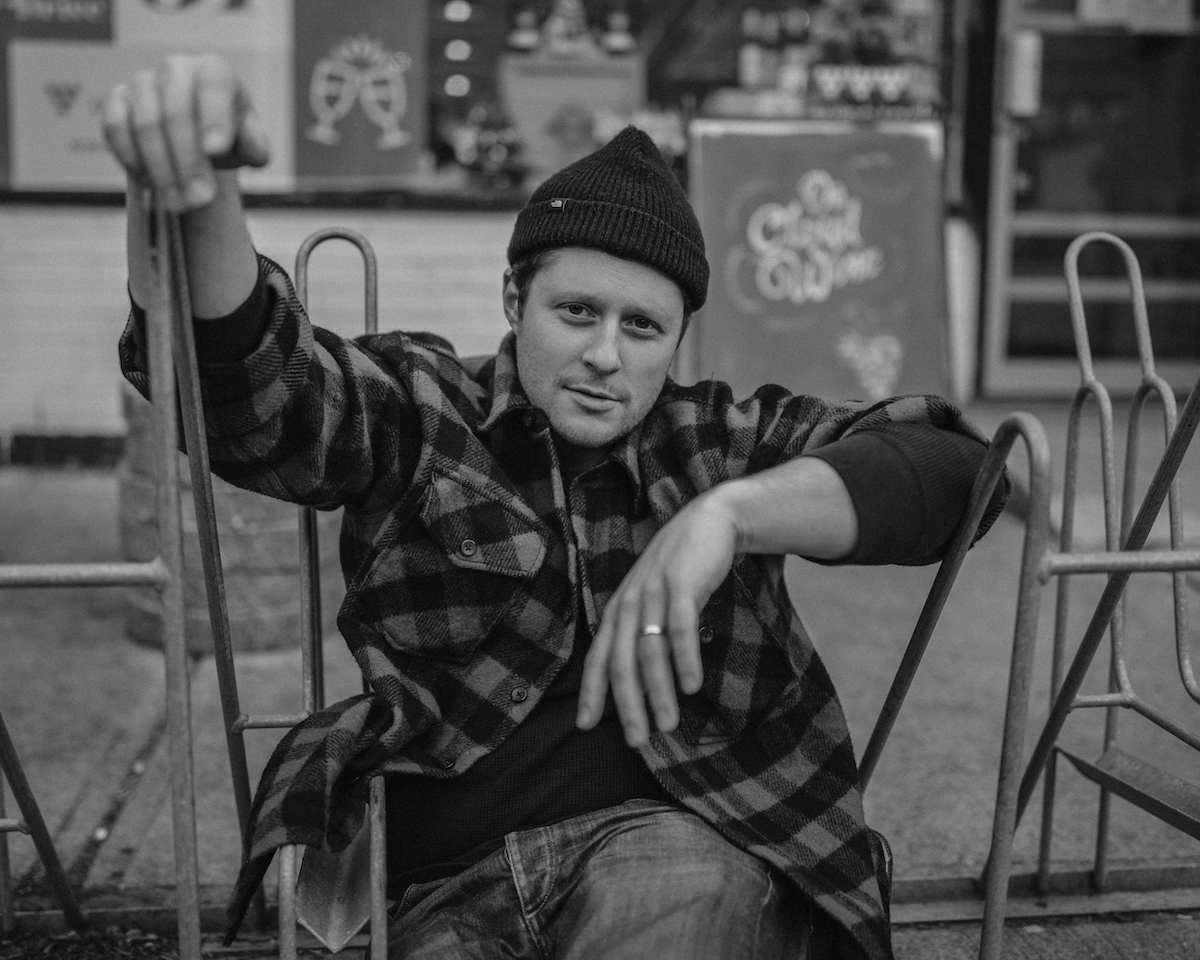
That's very humble of you to say. Are there any artists that you're listening to that you would really recommend our readers to check it out as well?
Noah Reid: Oh yeah! I’ll stick with my Canadians, I love Leif Vollebekk and always enjoy a Bahamas record, and The Weather Station is doing some incredible stuff and my friends Clever Hopes and Ian Lake, other Matt Barber, producorial offerings. And they’re all so great.
That's awesome, I love that you mentioned Leif. When I was listening to this record for the first time, I felt like it had the same weight and heat that his last record, New Ways, did.
Noah, thank you so much for your time today. It's been a pleasure. Congrats again on Adjustments' release!
Noah Reid: No worries man. That’s great, thank you, Mitch. This has been really fun!
— —
:: stream/purchase Noah Reid here ::
Stream: ‘Adjustments’ – Noah Reid
— — — —

Connect to Noah Reid on
Facebook, Twitter, Instagram
Discover new music on Atwood Magazine
? © Eric Hobbs
:: Stream Noah Reid ::


